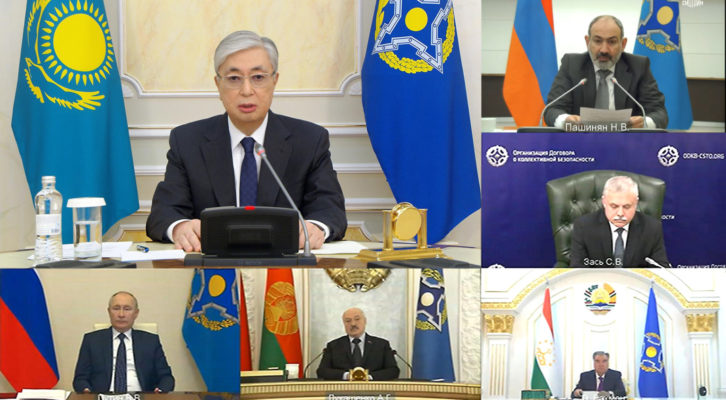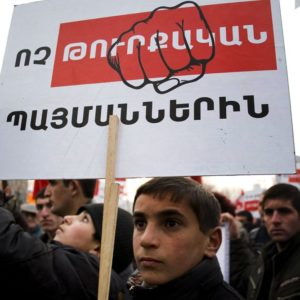In February 2021, I wrote an article “Turkey’s Pivot in Central Asia: A Calculated Risk?” and asked to what extent can Turkey push its pan-Turkic aspirations in Central Asia? If Turkey’s economic and energy relations in Central Asia continue to deepen, will it inevitably increase engagement on security issues as a means to protect them? Will Russia and China tolerate a NATO member exerting its influence near their traditional zones of influence? The developments in Kazakhstan clearly provided answers to these questions.
Long seen as the pole of stability in Central Asia, Kazakhstan has faced its most serious political crisis to date. What began as a reaction to a spike in fuel prices in the western oil-producing regions spread across the country with unprecedented calls for reform, before escalating into violence in the country’s biggest city, Almaty. The protest movement in Kazakhstan quickly escalated and turned violent as protesters seized and set alight government buildings. After failing to quell the unrest, President Kassym-Jomart Tokayev launched a “counter-terror” operation to regain control of the situation and appealed to the Russian-led Collective Security Treaty Organization (CSTO) for military assistance.
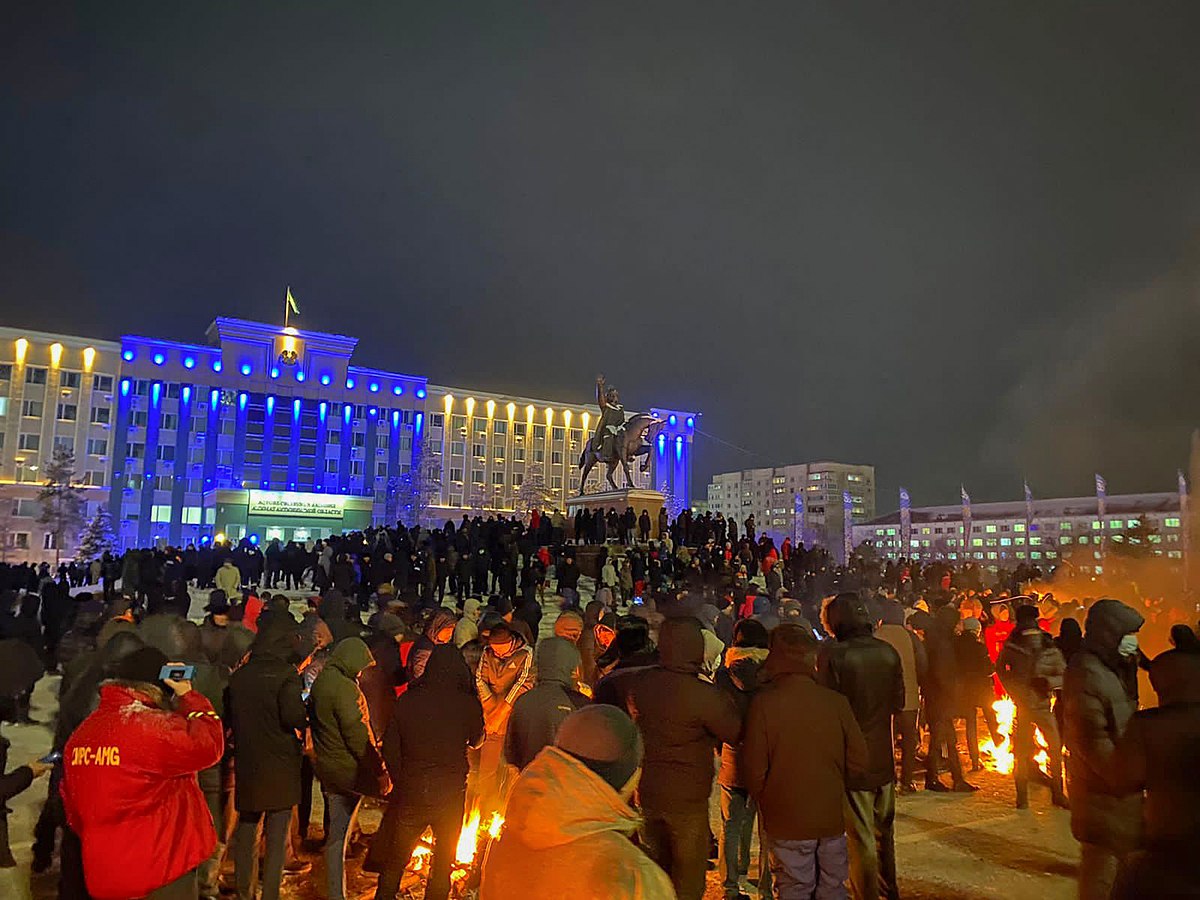
Protesters march on the central square of Aktobe, January 4, 2022 (Photo: Wikimedia Commons/Esetok)
On January 5, the alliance agreed to dispatch peacekeeping forces. In a Facebook post, Armenian PM Nikol Pashinyan, the chairman of the CSTO Collective Security Council, confirmed that the alliance will send peacekeepers to Kazakhstan at the country’s request. The question is, why did Kazakhstan request Russia’s help and choose Russia over the Turkic states? The following article will analyze how Russia, China and Iran viewed the events, highlight Turkey’s position, address whether Turkey had a role in this crisis and analyze its impact on Armenia and the region.
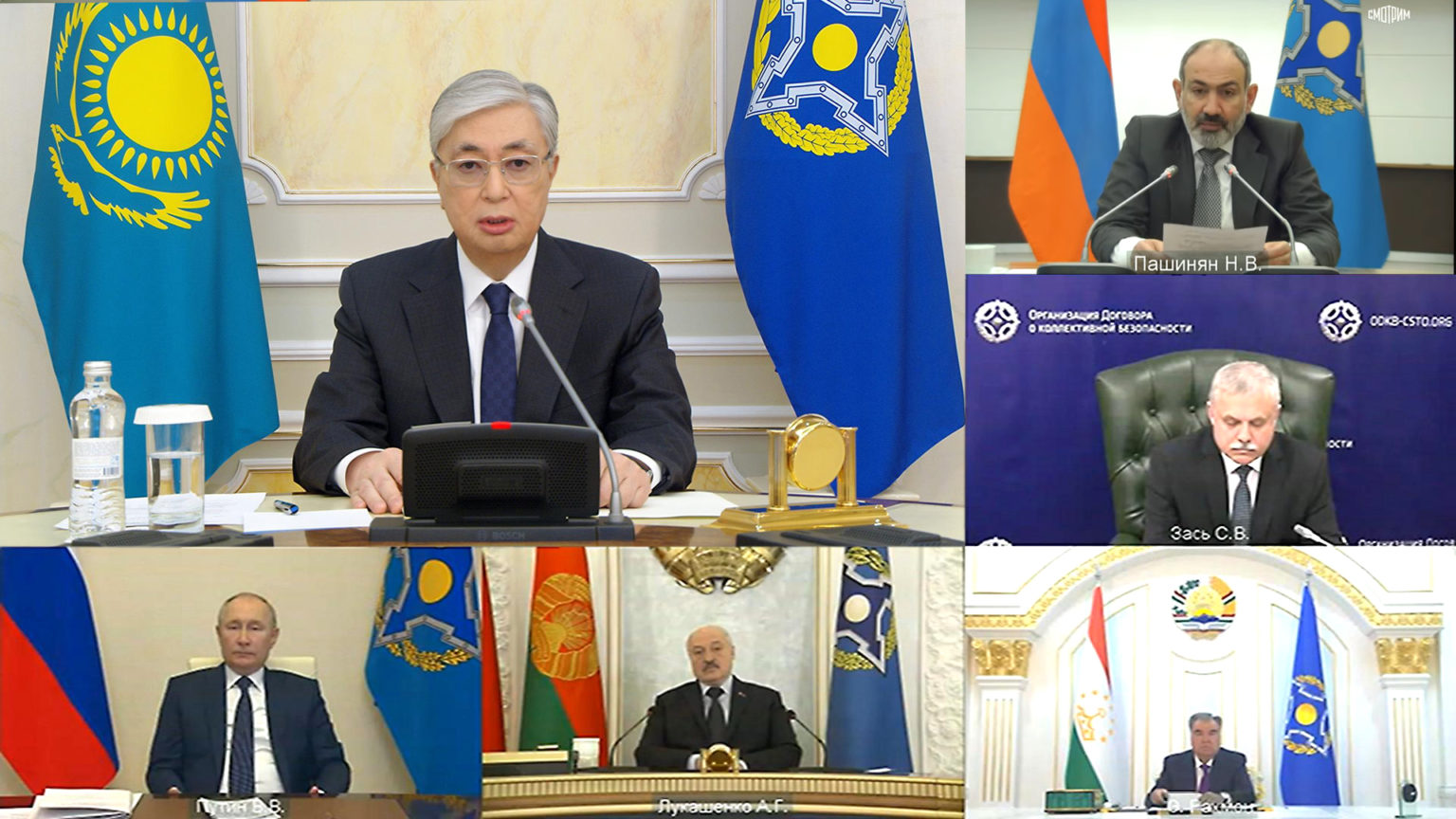
Extraordinary Session of the CSTO Collective Security Council, January 10, 2022 (Photo: Official website of the President of the Republic of Kazakhstan)
Background
Kazakhstan has a strategic position in Eurasia not only because of its large oil reserves and uranium deposits, but also due to its proximity to Russia, China and Iran; Kazakhstan’s security and stability are increasingly vital interests to all major regional powers. Throughout former President Nursultan Nazarbayev’s term, Kazakhs have sought to establish a system of collective security in Eurasia that would avert the emergence of a single dominant power. Kazakhstan’s “multi-vector” foreign policy was able to balance and pursue cooperative relations with all major powers. While it is a member of the Commonwealth of Independent States (CIS), the CSTO and the Shanghai Cooperation Organization (SCO), Kazakhstan has sought to diversify its security relations and keep its freedom to establish and maintain international partnerships.
According to Paul Stronski, a senior fellow in Carnegie’s Russia and Eurasia Program, a policy change for the pricing of liquefied petroleum gas reduced subsidies for the fuel, led to prices spiking in a matter of days and pushed people to protest. The peaceful protests turned into violent anarchy in a matter of hours as protesters and armed groups stormed government buildings and clashed with security forces.
This pushed the resignation of former President Nursultan Nazarbayev, who ruled the country from the late Soviet era to 2019 and has acted as an unofficial behind-the-scenes leader ever since he stepped down as head of the country’s Security Council. Rumors suggest some of his family members, among other prominent former officials, have left the country. Analysts suggest that the crisis was an outcome of a clash between Nazarbayev and Tokayev. Eventually, Russia emerged as the main winner and consolidated Tokoyev’s power, against former President Nazarbayev’s balanced and multi-vector foreign policy.
Perspectives from Moscow, Beijing and Tehran
Unlike the Syrian crisis, which Moscow responded to with intense military intervention after four years from its start, it took President Vladimir Putin only two days to send Russian-led troops to contain the crisis in Kazakhstan. Moscow viewed the crisis within the framework of its struggle against “international terrorism” and “external forces” that seek to destabilize countries on Russia’s borders and pose a threat to Russia’s national security.
Russia’s fast reaction and military deployment under the CSTO umbrella were unprecedented and caught the surprise of many foreign analysts. In an interview with the Armenian Weekly, Vlad Kondrashov, a Russian political scientist from Astrakhan and editor of the portal “Caspian Bulletin,” said that Russia was concerned about instability in the region as both countries share a seven thousand kilometer border. In this regard, “Moscow was not interested in destabilizing the situation in such a strategically important area of its security policy. For this reason, the Russian leadership reacted so quickly to the events in Kazakhstan.” Moscow’s measures also showed who has the muscle in Central Asia and clearly underscored its “red lines.”
Michael Tanchum, a senior associate fellow at the Austrian Institute for European and Security Policy (AIES), told Nikkei Asia that the Russian-led “CSTO intervention” in Kazakhstan was “an important cautionary signal” for Turkey and the Organization of Turkic States and “that their ambitions should not outrun their capacity.” Hence, this was a clear message that what has happened in Nagorno-Karabakh cannot be replicated in Central Asia. That is, Russia won’t share even temporary parity with Turkey in Central Asia.
However, Ivan Bocharov, a researcher at the Russian International Affairs Council (RIAC), told the Armenian Weekly that there is no strong evidence that Turkey was involved in the situation in Kazakhstan. Moreover, Bocharov argued that it is unlikely that Turkey could initiate the dispatch of peacekeepers to Kazakhstan. “As Turkey and Kazakhstan do not have such military-political memorandums as, for example, Turkey had with the Government of National Accord of Libya. That is, there are no legal grounds for the Turkish military presence in Kazakhstan. This applies to both bilateral relations between Turkey and Kazakhstan and multilateral formats, including the Organization of Turkic States,” added the researcher.
Kazakhstan is an important member of China’s Belt and Road Initiative (BRI). Beijing is concerned that instability in its neighbor could threaten energy imports and BRI projects there, and security in its western Xinjiang region, which shares a 1,770-kilometer border with Kazakhstan. For this reason, China welcomed CSTO’s peacekeeping mission. Its Foreign Minister stated that China was willing to “jointly oppose the interference and infiltration of any external forces” and expressed his country’s willingness to increase “law enforcement and security” cooperation with neighboring Kazakhstan and help oppose interference by “external forces.” Moreover, China’s President Xi Jinping told his Kazakhstan counterpart that China resolutely opposed any foreign force that destabilizes Kazakhstan and engineers a “color revolution.”
Iran was also wary that any attempt to destabilize Central Asia could pose an economic and national security threat. Iran views Kazakhstan as an increasingly important trade partner in Central Asia. On January 6, Iranian Foreign Ministry spokesperson Saeed Khatibzadeh addressed the violence in Kazakhstan, affirming that Tehran is closely monitoring the ongoing unrest and attaching importance to the country’s security and stability. It is important to mention that Tehran views the region through Russian lenses, and their geopolitical interests align in the region. Tehran is also wary of the perceived US role in destabilizing Central Asia, which could pose a threat to its security.
Therefore, Russia, China and Iran view the violent events in Kazakhstan as a chain of “color revolutions” instigated by the US and other western powers to achieve regime change and destabilize Eurasia. Whether justified or not, these three countries tend together to contain US expansion in Central Asia. The recent fall of Afghanistan to the Taliban has worried regional actors, insofar as radical Islamism combined with discontent amongst the young toward post-Soviet leaders may undermine domestic social cohesion.
Mixed Reactions from Turkey
Analysts believe that Turkey’s ambitions to become a Eurasian power in a Turkic world has met a “reality check.” Turkish social media was surprised and upset at how a Turkic state would ask the security assistance of a Russia-dominated CSTO and not Turkey. While Turkish officials did their best to take a neutral and diplomatic stance, opposition activists, media figures and military experts had different opinions.
On January 6, Turkish President Recep Tayyip Erdogan held talks with leaders and members of the Organization of Turkic States and reiterated that Turkey is in solidarity with Kazakhstan. Turkish Foreign Minister Mevlut Cavusoglu also spoke with his Azerbaijani and Russian counterparts about the situation in Kazakhstan but refrained from commenting on developments in the country himself. Meanwhile, Turkey’s parliament speaker Mustafa Sentop, AKP spokesman Omer Celik and presidential spokesman Ibrahim Kalin all reaffirmed the official position stating that Turkey stands with brotherly Kazakhstan and wishes the country’s quick return to peace and stability.
While opposition leaders expressed dissatisfaction with Turkey’s passive stance, Turkish nationalist İYİ opposition party leader Meral Aksener said that her party is “closely following the development of events in fraternal Kazakhstan,” indirectly hinting CSTO’s deployment. She stated that her “main desire is to preserve the independence and stability of Kazakhstan.” Meanwhile, former PM Ahmet Davutoğlu and founder/chairman of the opposition “Future” party, tweeted, “It is also concerning that because of those developments they (Kazakhstan’s leadership) had to ask help from the CSTO chaired by Armenia.”
This incident paved the way for a serious discussion within the Turkish military about the possibility of the creation of a “Turan/Pan-Turkic army” in the future to assist Turkic countries in their security or military needs. While Turkish officials have taken a careful and neutral stance on Russian and CSTO involvement in Kazakhstan, Turkish military experts had a different opinion. Retired Rear Admiral Cihat Yayci, who served as chief of staff of Turkish Naval Forces until 2020 and is the mastermind of the Turkish concept “Blue Homeland” (Mavi Vatan), told local media that “a Turan army should be established.” Yayci said it is unacceptable that Armenian forces entered Kazakhstan in the name of peacekeeping forces. Retired Brigadier General and former Turkish attaché in Azerbaijan Yudzhel Karauz also had a similar view; he stated, “The Organization of Turkic States must immediately take steps to create a joint armed force.” “At the very first meeting of the organization, legal measures should be taken regarding the creation of a joint military force and real steps must be taken. If we are late, we may cause irreparable damage. What is happening now in Kazakhstan can happen in other fraternal republics,” the retired general said.
These remarks caught the attention of the Turkish Defense Minister. When asked about the possibility of a future peacekeeping mission mandate for the organization, Minister Hulusi Akar told reporters, “These are all possibilities and all possibilities are on the table. As developments unfold, any such measures can be taken.” Such comments will surely be monitored closely in Moscow and Beijing.
Turkish conservative media outlets and reporters also expressed their dissatisfaction with CSTO’s peacekeeping mission. The conservative Islamist newspaper Yeni Akit came up with the following headline “Only Turkey is interested in a strong Kazakhstan.” The newspaper called on the state to take the same active role in resolving the escalation in Kazakhstan as in Bosnia and Herzegovina, Syria and Libya. The same newspaper on its front page called for the creation of a “Turkic-Islamic army” to resolve such issues. The newspaper accused Russia of “imperialism” and claimed that such “intervention will only aggravate the situation.” Turkish opposition newspaper “Karar” conducted an interview with the leader of the Crimean Tatars Mustafa Dzhemilev and published the headline “Who will now lead the Russians out of Kazakhstan?” According to Dzhemilev, the number of Russian troops in the region will grow steadily. He also accused Kazakhstan’s president of “betrayal” and stated, “the independence of Kazakhstan is at stake.” Finally, TRT World editor-at-large Yusuf Erim tweeted, “The only acceptable peacekeeping force to assist in stability in Kazakhstan is an Organization of Turkic States’ peacekeeping force, which should only be deployed at member state Kazakhstan’s request. Reports of Russian PMCs/Russian-led coalition is nothing less than an invasion.” It seems Erim forgot that the Organization of Turkic States is not a military alliance to conduct such a mission.
These reactions show that despite Turkey’s “passive” approach, at least publicly, the Turkish society and the political and military mood were not in favor of the CSTO’s decision and preferred to see a greater Turkish role in Kazakhstan.
Was there a silent Russian-Turkish confrontation in Kazakhstan?
For Bocharov, the events in Kazakhstan have shown that Turkey is not yet a military and political superpower in Central Asia. Despite this, he stated that we should take into consideration Turkey’s strong diplomatic and political positions in Central Asia and its historical and cultural kinship with Central Asian countries. Therefore, regional powers should not belittle Turkey. Bocharov stated, “The events in Kazakhstan will not so much expose the limitations of Turkey’s aspirations as will become a driver for Turkish future activity in Central Asia.” It is worth mentioning that after the entry of CSTO peacekeepers into Kazakhstan, President Erdogan held an urgent meeting of the heads of the member countries of the Organization of Turkic States. Further steps may be taken to improve the efficiency of Turkey’s military-technical and military-political cooperation with the countries of Central Asia. How successful will this strategy be? Bocharov believes that the effectiveness of military cooperation will indeed increase, but the level of military-political integration will not reach the level of the CSTO. As Kondrashov stated, the sphere of security and military cooperation in the region is much more the prerogative of Moscow. The Organization of the Turkic States has no common military forces or peacekeeping contingent, so Turkey had no reason to send its forces to the region. Turkey is unlikely to succeed in pushing Russia here.
The Russian-led operation was carefully calculated, unlike assumptions from the west, where mainstream media argued that CSTO peacekeepers will participate in the “crushing of the civilians.” Instead, Russia and the CSTO limited their role to securing key assets to allow Kazakh security forces to address the violence.
On January 12, the Kazakh President announced he requested the CSTO troops to leave the country as the country stabilized. Addressing the government and parliament in a live broadcast video conference, Tokayev thanked his allies and said, “The main mission of the CSTO peacekeeping forces has been successfully completed.” The next day, President Putin met Defense Minister Sergey Shoigu and stated, “Overall, it’s time to return home. We have accomplished our task.” Without a single drop of Russian blood, Russia engaged in a temporary military deployment and prevented a CSTO member from falling into anarchy.
Turkey’s assumed role is not clear, despite the fact that some Telegram sources accused Turkish Grey Wolves members of taking part in the riots. While Kazakh authorities announced that security forces have “detained eight thousand terrorists,” it is still not clear from where and who transferred these terrorists to Kazakhstan. If this accusation is true, then the authorities are responsible to provide details for the public.
Meanwhile, in response to accusations from Turkish politicians that Russians are tending to occupy Kazakhstan, Moscow’s official response to Turkey arrived on time. Erdogan’s chief adviser described what is happening in Kazakhstan as an occupation and announced, “They want to return the state, free from the 30-year Soviet yoke, striving for its wealth, culture, values, to this superficial and meaningless life. After the creation of the ‘Organization of Turkic States,’ our states began to be attacked.” In response, Russian Foreign Minister Sergei Lavrov said that he asked Turkey for clarification about the speech of the presidential adviser on Kazakhstan: “This is, to put it mildly, an incomprehensible statement by one of President Erdogan’s advisers, who condemned the invitation of Kazakhstan to the CSTO forces. We asked our Turkish colleagues to explain what this means,” stated the Minister. Earlier, Russian Foreign Ministry spokeswoman Maria Zakharova stated that Moscow expects that Turkey will refrain from ill-considered statements on Kazakhstan and will not try to “catch a fish in troubled waters.”
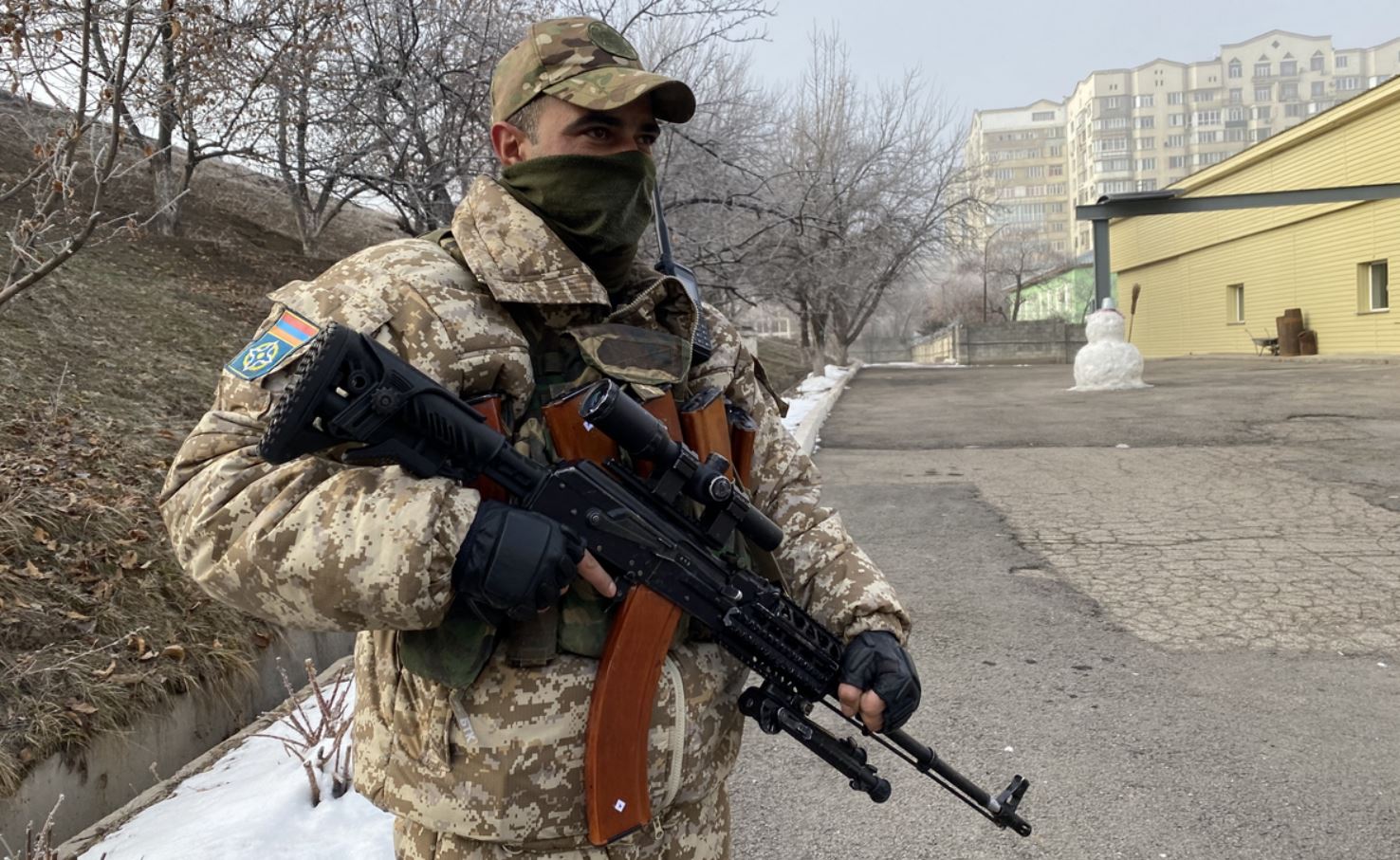
An Armenian peacekeeper of the CSTO forces in Kazakhstan (Photo: Ministry of Defense of the Russian Federation)
The Kazakh crisis also would have some impact on the South Caucasus and the future of co-opetition between Turkey and Russia, as Ankara realized its constraints in Central Asia. Additionally, Armenia’s political landscape once again proved that it lacks geopolitical maturity. Most of PM Pashinyan’s associates, NGOs (liberal and leftists) and the pro-US/West National-Democratic Axis movement leaders have criticized Armenia’s symbolic participation in the CSTO peacekeeping forces. Here, there are two arguments: that Armenia was supporting an authoritarian leader and that this would tarnish Yerevan’s image in the West; the second was that such a move would endanger the life of Armenians living in Kazakhstan. Surprisingly, parliamentary opposition factions also opposed this peacekeeping mission as they looked at the events from the “anti-Nikol” prism. However, few realized that Armenia’s options were limited. As a member of the CSTO, irrespective of the alliance’s passive stance towards the Armenian-Azerbaijani conflict, Armenia was under a duty to assist this mission. This was important for Russia, as Moscow wanted to show NATO that its alliance is firm and united against foreign threats. Moreover, Armenia also showed its allies that in times of crisis, Yerevan supports the member states, even though it was abandoned by its CSTO allies during the Azerbaijani incursions on Armenian territories. In such circumstances, Armenia cannot remain neutral amid the expansion of possible pan-Turkic dangers in the region.


